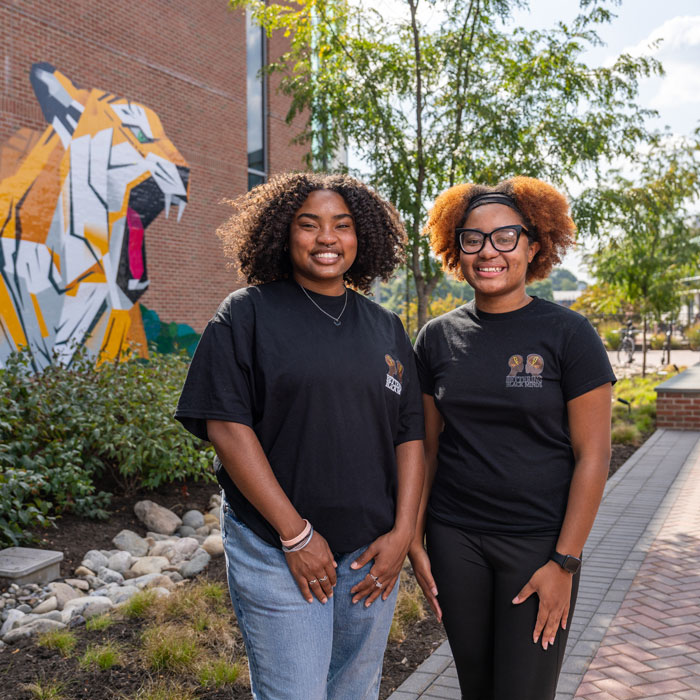Encouraging cultural immersion in French language learning
Assistant Professor Alisha Reaves talks Francophone culture, studying abroad
Cultural immersion is critical when learning a second language. In her French courses at TU and abroad, Alisha Reaves, Ph.D., brings cultural literacy and exploration of Francophone countries to the forefront of language learning.
“Learning French doesn’t have to be scary and hard. You can make it accessible. Part of that is expanding what we talk about in the classroom,” she says.
For Reaves, to teach French language studies effectively is to strive to understand the many Francophone cultures that exist across the world—through visiting and experiencing them. This year, she will do just that through the Fulbright Hayes Group Projects Abroad Program and faculty-led study abroad programs at TU.
The Fulbright Hayes Group Projects Abroad Program offers grants to support overseas projects in training, research and curriculum development in modern foreign languages for teachers, students and faculty engaged in a common interest.
This year, Reaves and 13 other educators will spend a month in Côte d'Ivoire conducting research through which she will prepare curricula and materials about Ivoirian culture that French teachers in the U.S. can use to diversify their curricula.
There were a number of reasons Reaves sought out the opportunity, expanding her own Francophone knowledge of West Africa was chief among them.
“When it comes to West African countries, I don’t have any first-hand experience like I do with Quebec or Belgium. This program is an opportunity to experience and learn about a new culture that I can bring back and share with students,” Reaves says.
Expanding French language learning at TU
Reaves and her colleagues in the Department of Languages, Literatures & Cultures in the College of Liberal Arts have been finding ways to expand and infuse Francophone-culture-focused classes into the course catalog.
Often when anglophone Americans think of French language, they envision France. They may not know about French territories like Reunion Island and its rich cultural and linguistic makeup or West African, French-speaking countries like Côte d'Ivoire.
“Thinking about my studies in French, it was all very focused on France—mostly medieval studies. Twenty years later, students still aren’t getting exposed enough to the rest of the Francophone world,” says Reaves.
Expanding the course catalogue coincides with Reaves' outreach to French-speaking diasporic populations on campus. The program has offered courses on varieties of French and linguistics, cultures within the Maghreb region of North Africa and faculty-led study abroad opportunities.
“Reframing the French program in terms of its curriculum and its connection to students has resulted in a growing community of students interested in taking classes and majoring in French," says Jennifer Ballengee, chair of the Department of Languages, Literatures, and Cultures. "Since the start of this initiative, we’ve had a 26% growth in majors. What’s more, the focus on culture and language makes it clear to students how language learning can contribute to career success as well as personal growth.”
Culture abroad
Reaves first practiced what she now preaches to students when she earned her bachelor's degree. She applied for the Teaching Assistant Program in France (TAPIF).
The program sends college graduates to France and several French-speaking territories, including Reunion Island and the Caribbean, where they teach students there how to speak English and about American culture.
It taught her a great deal about French culture and about cultural literacy.
“There are different ways to speak French and all of them are acceptable. By understanding that people speak differently in different countries, there’s an ability to empathize with other cultures and understand them as we interact with each other more,” says Reaves.
Reaves encourages her students to look at French language learning and teaching through an interactive and experiential lens and above all, she loves sharing the joy of language with others.
“My goal when I started school was that I just wanted to speak French every day. I love being able to share that with others and getting that same joy out of students exploring something new and developing the ability to do something they didn’t think they could do,” Reaves says.

Study Abroad with Dr. Reaves
Join Dr. Reaves in Aix-en-Provence, France in Summer 2025
- Spend four weeks in the South of France
- Stay with a host family and take courses at the Institute for American Universities
- Learn about culture, history and the arts
- Earn three French credits
- Receive a $300 scholarship courtesy of the College of Liberal Arts


